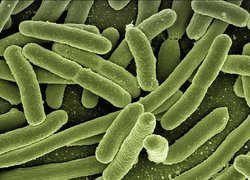
Aug. 28, 2017
By: Michael Feldman
IBM is teaming up with four research institutions in an effort to study the effects of the human microbiome on autoimmune diseases. The effort, known as the Microbiome Immunity Project, is purported to be the “largest study to date of the bacteria in the human microbiome.”
 The computational work involved in this effort involved mapping the millions of bacterial genes found in the human microbiome to help predict the structure of the proteins they encode. Ultimately, the researchers hope to apply what’s learned to help treat autoimmune diseases, which many scientists believe have a strong association with specific microbiome profiles.
The computational work involved in this effort involved mapping the millions of bacterial genes found in the human microbiome to help predict the structure of the proteins they encode. Ultimately, the researchers hope to apply what’s learned to help treat autoimmune diseases, which many scientists believe have a strong association with specific microbiome profiles.
The project will bring together researchers from the Broad Institute of MIT and Harvard, Massachusetts General Hospital, University of California San Diego, and the Simons Foundation’s Flatiron Institute, who will work in conjunction with IBM Corporate Citizenship teams. It will use IBM’s World Community Grid, which is essentially a free-form supercomputer that scavenges compute cycles from more than 3 million PCs and mobile devices donated by individuals. The idea is to use its distributed computational power for research projects, most of which are aimed at health and other humanitarian challenges. To date, the grid has supported 29 of these projects, including those studying HIV/AIDS, the Zika virus, clean water, and renewable energy.
For the Microbiome Immunity Project, the effort will initially focus on the microbiome of the gut, where the largest number and diversity of bacteria are found. According to Dr. Ramnik Xavier, Co-director of the Infectious Disease and Microbiome Program at the Broad Institute of MIT and Harvard, a project of this scale has never been attempted before, and will require an enormous amount of computational power. “We’re dealing with thee million genes on the bacteria side, and 20 thousand genes on the human side,” explained Xavier.
To put that in perspective, of all the genetic material present in the body, less than one percent of it is encoded in the human genome. The other 99-plus percent of our genetics is in the bacteria that inhabits our gut, skin, nose and mouth. As it turns out these are not just hitch-hikers, taking advantage of the congenial conditions provided by our bodies. These bacteria also provide useful functions for us in the form of digestion, immunity, and the production of a whole range of metabolically interesting compounds.
Interest in the microbiome has been steadily rising, as scientists, doctors, and nutritionists have learned that the microbiome is an essential element to human health. Not only do these bacteria provide useful byproducts from the food we ingest, they also can train our immune systems to resist diseases. The lack of a healthy microbiome has been implicated in a number of autoimmune diseases like Type 1 diabetes, Crohn’s disease, and ulcerative colitis. A dysfunctional microbiome has also been associated with a variety of chronic illnesses, including arthritis, heart disease, metabolic syndrome, asthma, and a number of cancers. Some scientists theorize the increasing prevalence of these diseases is associated with the more hygienic conditions found in modern life, as well as the widespread use of antibiotics.
Dr. Rob Knight, one of the principal investigators of the Microbiome Immunity Project, leads a team at the Center for Microbiome Innovation at UC San Diego, and is one of the foremost authorities in microbiome science. “Had World Community Grid not existed, we wouldn't have even contemplated this project,” said Knight. “By harnessing the efforts of volunteers, we can do something that exceeds the scale of what we have access to by a factor of thousands. For the first time, we're bringing a comprehensive structural biology picture to the whole microbiome, rather than solving structures one at a time in a piecemeal fashion. "
Earlier this year, Knight delivered a presentation on some of the latest research on the human microbiome, its computation needs, and how it impacts not just diseases, but aging as well. If you’re interested and have an hour to spare, it’s well worth viewing.
<iframe src="https://www.youtube.com/embed/2iKHMyWzclM?rel=0&controls=0" width="760" height="428" frameborder="0" allowfullscreen="allowfullscreen"></iframe>
